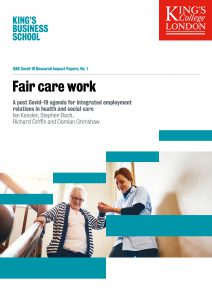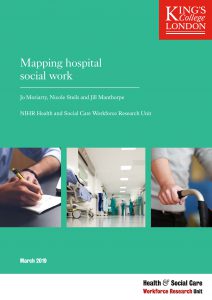 Ian Kessler, Stephen Bach, Richard Griffin and Damian Grimshaw introduce their new paper, Fair care work. A post Covid-19 agenda for integrated employment relations in health and social care, published yesterday by King’s Business School. Lead author, Professor Kessler, is Deputy Director of the NIHR Policy Research Unit in Health and Social Care Workforce. (908 words)
Ian Kessler, Stephen Bach, Richard Griffin and Damian Grimshaw introduce their new paper, Fair care work. A post Covid-19 agenda for integrated employment relations in health and social care, published yesterday by King’s Business School. Lead author, Professor Kessler, is Deputy Director of the NIHR Policy Research Unit in Health and Social Care Workforce. (908 words)
The courage and sacrifice of the health and social care workforce have emblazoned themselves on the national consciousness as the challenge of COVID-19 continues. While classified as ‘key workers’, along with other occupations essential to the community in times of crisis, the distinctive contribution of frontline care workers, reflected in their direct and relentless engagement with the virus, has until recently been reflected in the Thursday night applause reserved for them. This public applause sits uneasily, however, with the treatment of over two million health and social care employees, mostly women, often from black and minority ethnic backgrounds, typically in undervalued, relatively low paid and insecure employment. In a new paper, we seek to kick start a policy debate on the development of fair care work, to stimulate discussion on a refreshed employment relations (ER) agenda which acknowledges and reflects the worth of care workers to our individual and communal well-being. Continue reading
 Dr. Nayyara Tabassum is Evidence Officer in the
Dr. Nayyara Tabassum is Evidence Officer in the 
 Richard Griffin MBE,Visiting Senior Research Fellow, King’s Business School, today begins a series of guest posts on the healthcare workforce. He argues that, in the face of the widely acknowledged problem of shortages in this workforce, we should turn to current NHS support staff for part of the solution. (477 words)
Richard Griffin MBE,Visiting Senior Research Fellow, King’s Business School, today begins a series of guest posts on the healthcare workforce. He argues that, in the face of the widely acknowledged problem of shortages in this workforce, we should turn to current NHS support staff for part of the solution. (477 words)


